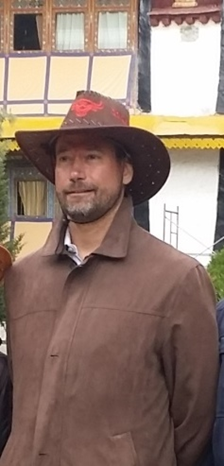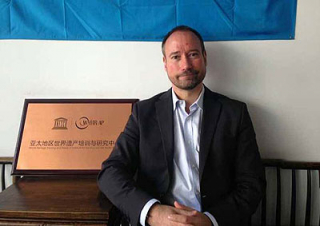I was both privileged and deeply saddened to spend time with Ron, just before his tragic death on 28 April 2015. We were both on a World Heritage Reactive Monitoring Mission, in the city of Lhasa in China. His sudden departure was a shocking experience to me as much as to all of you.
Ron was a personal friend of mine before he entered the UNESCO world. He was introduced to me in 1998 by late Prof Fritz Van Voorden of Delft University of the Netherlands, under whose guidance we both obtained our doctoral degrees. Since then, he was a close friend and a colleague, and his departure in this manner is hard to cope with. I am well aware how much you will miss him as a professional and a colleague.
I should take this opportunity to express my deepest appreciation to all Chinese authorities (SACH, CACH, Governor’s office of Tibet autonomous region, Municipality of Lhasa, heritage institutions of all agencies) for supporting Ron from the moment he was taken ill, accompanying him to the hospital and for their extraordinary commitment and help.
The Deputy Governor of the province paid me a visit after the tragic event, and wearing his Buddhist hat mentioned that he believed Ron ‘belonged to Tibet’ and it was his last destiny.
Ron’s sudden departure in this most religious and sacred landscape reminded me of my own Buddhist beliefs and the words of the Lord Buddha, that ‘the most certain thing about life is its uncertainty.’
My thoughts are with Ron’s family and colleagues. I will miss him dearly.
Gamini Wijesuriya
Project Manager, ICCROM
It is with profound sadness that ICCROM has learned of the death of our friend and colleague, Ron van Oers, while on a reactive monitoring mission with representatives of ICCROM and ICOMOS to the World Heritage Property of the, Historic Ensemble of the Potala Palace, Lhasa.
An urban planner by profession, Ron received his PhD in 2000 with a dissertation on 17th and 18th Century Dutch Colonial Town Planning. In 2000, Ron joined the UNESCO World Heritage Centre in Paris, where he was Chief of Unit for the Latin America and the Caribbean, and then headed up the World Heritage Cities Programme. In 2009, he joined the World Heritage Institute of Training and Research for the Asia and the Pacific Region (WHITR-AP) located in Shanghai, China, and became its Vice-Director in 2012.
Ron had a long and fruitful collaboration with ICCROM on issues related to urban conservation. He was one of the key promoters of the development of the UNESCO Recommendation on the Historic Urban Landscape (HUL), and co-authored two volumes on HUL with Francesco Bandarin following its successful adoption by UNESCO. His interests also included modern heritage, and the relationship of contemporary architecture to the historic environment.
While at WHITR-AP, he collaborated with ICCROM on the implementation of two courses in China on the topic of Heritage Impact Assessment. The first of these courses took place in Lijiang in 2012 and the second in Dujiangyan in 2014. Ron was also a lecturer at the ICCROM Conservation of Built Heritage Course in 2010, within a special module on Urban Conservation.
Ron was an excellent teacher and thinker, and a passionate advocate for heritage conservation. He was a good colleague and a good friend to many in the heritage community, and he will be sorely missed.
The staff of ICCROM offers our condolences to his wife and family, to his colleagues at UNESCO and WHITR-AP, and to all his other friends in the heritage community worldwide.


